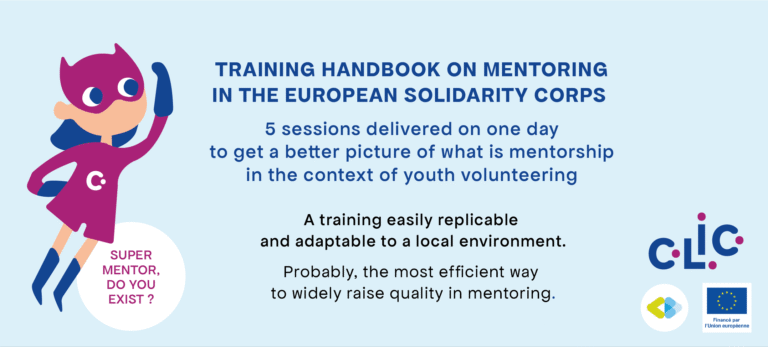C.L.I.C Mentor Training Handbook

This training handbook is the result of a collective process which involves the consultation of 100 mentors of the European Solidarity Corps volunteering programme, the active contribution of 10 youth organisations from 9 European countries, and the dedication of various people who devoted numerous working hours in thinking about, designing, testing and adjusting the different training parts.
Our intention, by creating this one-day training, was not to cover the role of mentors extensively and completely. Rather the training presented below can be seen as an “appetizer” or, “gate opener” to new learning paths about mentoring and its scope within the European Solidarity Corps.
Limited to 8 working hours, on 1 single day, our training intends to offer an easily accessible opportunity to meet, at the local level, and exchange about the topic of European youth volunteering and mentoring that accompanies it. The training offers the opportunity to various stakeholders, such as youth workers, project managers, and mentors to receive basic references and develop a common understanding of mentoring young European volunteers.
Our training aims to reach the diversity of the people who endorse the role of mentor. In the focus groups that we have conducted we listened to the input and experiences of people with various different backgrounds, ranging from experienced youth workers from big ESC LEAD organizations, professional coaches, and employees of the host organisations, to parents from a kindergarten and young local peers who take on the role in their free time, all of them identifying as “ESC mentors”. From this variety of actors, how can we build supportive communities around the central character of the young volunteer?
How can we offer guarantees to the young people they will not be left alone with the numerous challenges (language barriers, social integration and inclusion, learnings recognition…) they may undoubtedly encounter while volunteering abroad?
One response is to enable lead organisations to deliver trainings for stakeholders at their local level. This will significantly contribute to the quality of support offered to both volunteers and host organisations. Organizing easily accessible local training brings the ESC program closer to mentors working on the field. It provides an opportunity to create and foster local networks between mentors and civil society organisations and empowers them to be active at the European level.
For this purpose, our training is conceived to be easily replicable.
In this Training Handbook
and on project website
you find all the information, resources, and guidelines you need to implement the training. We hope you find it useful, and that it will support you in raising awareness about ESC mentoring and building strong support networks in your circles of youth volunteering.
Feel free to use and adapt the training material to your needs, as long as you use it with care and the purpose of enhancing youth empowerment and European values.